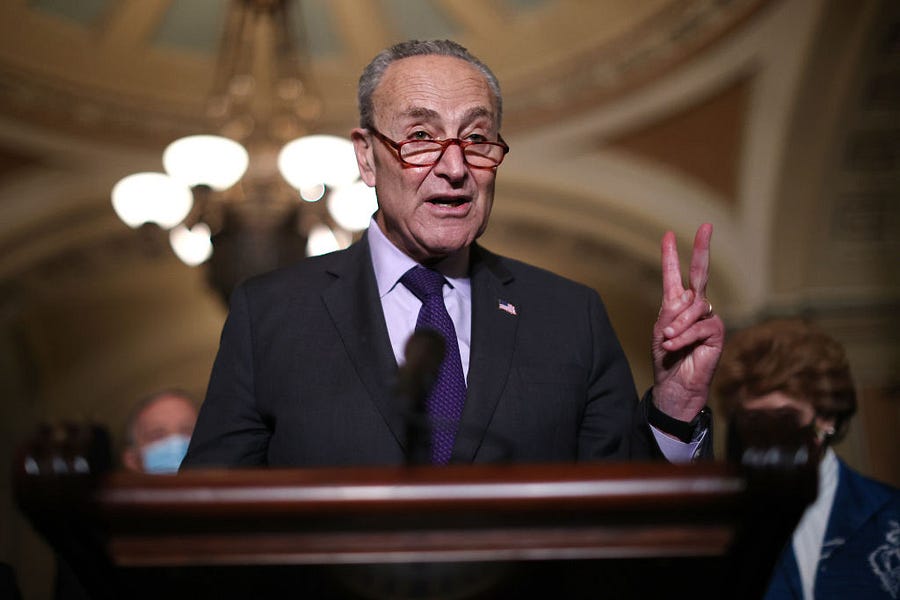Congress is, in the words of GOP Sen. John Cornyn on the Senate floor Monday, in a “legislative mad dash,” attempting to push through the ambitious $1.75 trillion Build Back Better Act, pass the next debt ceiling increase to prevent the U.S. from defaulting on its loans, and authorize legislation to fund the government into early next year.
But the Senate is also locked in a battle over the $770 billion National Defense Authorization Act (NDAA) to fund the military’s annual budget. Lawmakers had hoped to advance a roll call vote on 25 amendments through unanimous consent on Wednesday night, but those bipartisan plans broke down when an amendment by Sen. Marco Rubio to ban imports from China’s Xinjiang region—where China’s Uyghur camps are located—was not included on the final list of amendments for procedural reasons.
“The irony, the sort of absurdity, and the sadness of this is if his amendment were on the bill, it would automatically kill the bill, because it would be what’s called a blue-slip in the House, which means any bill that produces revenues must start from the House and the House will kill a bill that contains it,” Democratic Majority Leader Chuck Schumer said on the Senate floor Wednesday evening.
Schumer has wanted to get the bill, which gives Congress a crucial role in establishing defense priorities and allows the Pentagon to implement new military programs, on President Joe Biden’s desk ahead of the new year to avoid punting the bill into January for the first time in 60 years.
“We could be in every weekend between now and Christmas,” Democratic Sen. Debbie Stabenow told reporters Monday evening.
Even before Wednesday night, senators on both sides of the aisle were laying blame on each other for stalling the NDAA’s debate—which is usually well underway before November—and passage. The House cleared the bill in September, but Democratic Senate Majority Leader Chuck Schumer waited until late November to bring it to the floor for debate, more than two months after the Armed Services Committee filed.
“I do think this an unforced error on the part of Schumer,” Democratic Rep. Adam Smith, chairman of the House Armed Services Committee, told Politico back in early November. “He’s the guy in charge. He’s the guy who’s decided not to bring it up.”
“From a process standpoint, I can’t argue with the Senate Republicans on this issue,” Smith added. “There is no reason that this bill has not been put on the floor in the Senate,” he added.
The amendment vote kerfuffle follows Senate Democrats’ failed attempt to pass a cloture motion Monday, which would have formally ended debate on the NDAA. But the cloture vote garnered only 41 “yeas,” well short of the 60-vote threshold needed by Democrats to advance the bill, with the vast majority of GOP senators voting against the motion on the grounds that the chamber had spent insufficient time debating the 19 amendments that were under consideration. Five progressive-leaning Democrats—Sens. Ed Markey, Jeff Merkley, Bernie Sanders, Elizabeth Warren, and Ron Wyden—also voted against Monday’s cloture motion over concerns about the bill’s price tag.
Two additional amendments were tacked on Tuesday night in an effort to pull Republicans into the fold, including one to sanction a Russian pipeline to Europe, and three more were put under consideration to win over the holdouts on unanimous consent.
GOP Sens. Jim Risch and Ted Cruz’s push to sanction Nord Stream 2, a natural gas conduit expected to make Europe more energy-reliant on Russia, put many of the chamber’s Democrats in an awkward position. Several lawmakers have publicly opposed the project, but the Biden administration’s recent move to waive sanctions on the company undertaking its construction has discouraged Democrats from taking up the amendment.
“It is especially bizarre to see the Democratic leader so focused, so intent, on blocking the Senate from dealing seriously with the growing aggression from Putin’s Russia,” GOP Senate Minority Leader Mitch McConnell said on the Senate floor Tuesday. “He seems downright desperate to block new bipartisan action on Nord Stream 2. It’s strange to see.”
“Democrats prematurely moved for cloture to avoid accountability on critical amendments, such as Nord Stream 2 sanctions and are hiding from tough votes that voters would hold them accountable for,” Sen. Roger Wicker, the No. 2 Republican on the Senate Armed Services Committee, told The Dispatch. “Senator Schumer had the entire year to take up NDAA, but unwisely prioritized President Biden’s radical economic agenda over our national defense.”
Among the other controversial proposed amendments are a measure to require women to register for the Selective Service and the Secure and Fair Enforcement (SAFE) Banking Act, which would allow financial institutions to offer services to state-licensed marijuana companies.
Schumer has been quick to point out that seven Republicans shot down an effort to hold a roll call vote on 18 amendments late last month. “This latest Republican obstruction comes after Senate Republicans rejected a bipartisan agreement before Thanksgiving from Senators Reed and Inhofe to hold roll call votes on 19 amendments (9 of which are led by Republicans), which would be more roll call votes on amendments to the NDAA in the Senate than the last four years under Leader McConnell combined,” Schumer said after Monday’s failed cloture vote.
Adam Smith might have questioned Schumer’s timing back in early November, but shifted blame to Senate Republicans for obstructing the legislative process. “You can’t include every single amendment, so no, I don’t empathize with [Senate Republicans],” Smith told The Dispatch Tuesday. “I mean, at this point, they’re the ones who are blocking action on it.
Smith also sidestepped a question about why it took so long for Schumer to bring the bill on the Senate floor in the first place. “I’m not gonna deal with that issue at the moment,” Smith added. “For right now, getting into that doesn’t advance my interest because I’m trying to get the bill passed.”
Uncertainty surrounding the continuing resolution, which provides funding for the Department of Defense and other agencies, also complicates congressional NDAA negotiations. The bill to fund the government must be passed by both the House and Senate by Friday to avert a government shutdown. As of Wednesday night, the legislation still hadn’t passed the House.
These setbacks come at a time when the U.S. faces challenges from adversaries across the globe. Republican critics of the NDAA as it stands argue that their Democratic counterparts—who prior to and during the 2020 elections had Russia firmly in their crosshairs—have gone soft on Moscow amid increasingly aggressive posturing from President Vladimir Putin. Several ransomware attacks originating from Russian soil have battered American critical infrastructure this year and Putin has twice mobilized thousands of troops near Ukraine’s border.
China, which Democratic and Republican lawmakers alike consider the single greatest threat to the U.S.’s military and economic hegemony, continues to conduct military aircraft exercises near Taiwan’s airspace. Republicans have also pointed to Beijing’s recent hypersonic weapons tests and rapid construction of nuclear silos as evidence of the Chinese Communist Party’s growing military threat.
Republicans have spent the week insisting that Democrats are pushing national security amendments to the wayside in their effort to advance the NDAA to Biden’s desk before the new year. “I think they just feel pressured to get so many of these other things done instead of focusing on the one thing that we should be doing, which is focus on national security,” Republican Sen. Joni Ernst of Iowa told The Dispatch during Monday’s cloture vote. “I think they’re under the gun to get other things done and they should be focusing on this.”








Please note that we at The Dispatch hold ourselves, our work, and our commenters to a higher standard than other places on the internet. We welcome comments that foster genuine debate or discussion—including comments critical of us or our work—but responses that include ad hominem attacks on fellow Dispatch members or are intended to stoke fear and anger may be moderated.
You are currently using a limited time guest pass and do not have access to commenting. Consider subscribing to join the conversation.
With your membership, you only have the ability to comment on The Morning Dispatch articles. Consider upgrading to join the conversation everywhere.